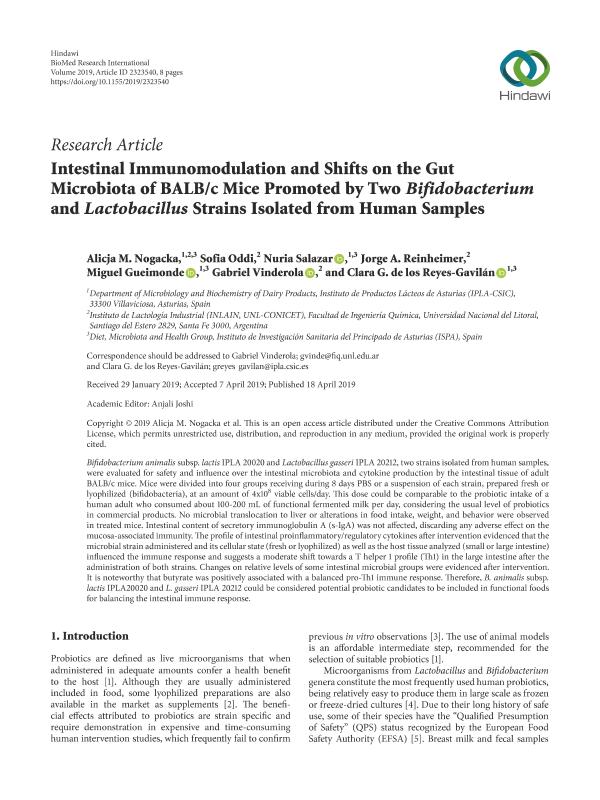Mostrar el registro sencillo del ítem
dc.contributor.author
Nogacka, Alicja M.
dc.contributor.author
Oddi, Sofia Lorena

dc.contributor.author
Salazar, Nuria
dc.contributor.author
Reinheimer, Jorge Alberto

dc.contributor.author
Gueimonde, Miguel
dc.contributor.author
Vinderola, Celso Gabriel

dc.contributor.author
De Los Reyes Gavilán, Clara G.
dc.date.available
2020-10-28T20:38:01Z
dc.date.issued
2019-06
dc.identifier.citation
Nogacka, Alicja M.; Oddi, Sofia Lorena; Salazar, Nuria; Reinheimer, Jorge Alberto; Gueimonde, Miguel; et al.; Intestinal Immunomodulation and Shifts on the Gut Microbiota of BALB/c Mice Promoted by Two Bifidobacterium and Lactobacillus Strains Isolated from Human Samples; Hindawi Publishing Corporation; BioMed Research International; 2019; 6-2019; 1-9
dc.identifier.issn
2314-6141
dc.identifier.uri
http://hdl.handle.net/11336/117102
dc.description.abstract
Bifidobacterium animalis subsp. lactis IPLA 20020 and Lactobacillus gasseri IPLA 20212, two strains isolated from human samples, were evaluated for safety and influence over the intestinal microbiota and cytokine production by the intestinal tissue of adult BALB/c mice. Mice were divided into four groups receiving during 8 days PBS or a suspension of each strain, prepared fresh or lyophilized (bifidobacteria), at an amount of 4x108 viable cells/day. This dose could be comparable to the probiotic intake of a human adult who consumed about 100-200 mL of functional fermented milk per day, considering the usual level of probiotics in commercial products. No microbial translocation to liver or alterations in food intake, weight, and behavior were observed in treated mice. Intestinal content of secretory immunoglobulin A (s-IgA) was not affected, discarding any adverse effect on the mucosa-associated immunity. The profile of intestinal proinflammatory/regulatory cytokines after intervention evidenced that the microbial strain administered and its cellular state (fresh or lyophilized) as well as the host tissue analyzed (small or large intestine) influenced the immune response and suggests a moderate shift towards a T helper 1 profile (Th1) in the large intestine after the administration of both strains. Changes on relative levels of some intestinal microbial groups were evidenced after intervention. It is noteworthy that butyrate was positively associated with a balanced pro-Th1 immune response. Therefore, B. animalis subsp. lactis IPLA20020 and L. gasseri IPLA 20212 could be considered potential probiotic candidates to be included in functional foods for balancing the intestinal immune response.
dc.format
application/pdf
dc.language.iso
eng
dc.publisher
Hindawi Publishing Corporation

dc.rights
info:eu-repo/semantics/openAccess
dc.rights.uri
https://creativecommons.org/licenses/by-nc-sa/2.5/ar/
dc.subject
Probiotics
dc.subject
Mice
dc.subject.classification
Alimentos y Bebidas

dc.subject.classification
Otras Ingenierías y Tecnologías

dc.subject.classification
INGENIERÍAS Y TECNOLOGÍAS

dc.title
Intestinal Immunomodulation and Shifts on the Gut Microbiota of BALB/c Mice Promoted by Two Bifidobacterium and Lactobacillus Strains Isolated from Human Samples
dc.type
info:eu-repo/semantics/article
dc.type
info:ar-repo/semantics/artículo
dc.type
info:eu-repo/semantics/publishedVersion
dc.date.updated
2020-10-14T21:24:25Z
dc.journal.volume
2019
dc.journal.pagination
1-9
dc.journal.pais
India

dc.description.fil
Fil: Nogacka, Alicja M.. Instituto de Investigación Sanitaria del Principado de Asturias; España. Consejo Superior de Investigaciones Científicas. Instituto Superior de Productos Lácteos de Asturias; España. Consejo Nacional de Investigaciones Científicas y Técnicas. Centro Científico Tecnológico Conicet - Santa Fe. Instituto de Lactología Industrial. Universidad Nacional del Litoral. Facultad de Ingeniería Química. Instituto de Lactología Industrial; Argentina
dc.description.fil
Fil: Oddi, Sofia Lorena. Consejo Nacional de Investigaciones Científicas y Técnicas. Centro Científico Tecnológico Conicet - Santa Fe. Instituto de Lactología Industrial. Universidad Nacional del Litoral. Facultad de Ingeniería Química. Instituto de Lactología Industrial; Argentina
dc.description.fil
Fil: Salazar, Nuria. Instituto de Investigación Sanitaria del Principado de Asturias; España. Consejo Superior de Investigaciones Científicas. Instituto Superior de Productos Lácteos de Asturias; España
dc.description.fil
Fil: Reinheimer, Jorge Alberto. Consejo Nacional de Investigaciones Científicas y Técnicas. Centro Científico Tecnológico Conicet - Santa Fe. Instituto de Lactología Industrial. Universidad Nacional del Litoral. Facultad de Ingeniería Química. Instituto de Lactología Industrial; Argentina
dc.description.fil
Fil: Gueimonde, Miguel. Instituto de Investigación Sanitaria del Principado de Asturias; España. Consejo Superior de Investigaciones Científicas. Instituto Superior de Productos Lácteos de Asturias; España
dc.description.fil
Fil: Vinderola, Celso Gabriel. Consejo Nacional de Investigaciones Científicas y Técnicas. Centro Científico Tecnológico Conicet - Santa Fe. Instituto de Lactología Industrial. Universidad Nacional del Litoral. Facultad de Ingeniería Química. Instituto de Lactología Industrial; Argentina
dc.description.fil
Fil: De Los Reyes Gavilán, Clara G.. Consejo Superior de Investigaciones Científicas. Instituto Superior de Productos Lácteos de Asturias; España. Instituto de Investigación Sanitaria del Principado de Asturias; España
dc.journal.title
BioMed Research International
dc.relation.alternativeid
info:eu-repo/semantics/altIdentifier/doi/http://dx.doi.org/10.1155/2019/2323540
dc.relation.alternativeid
info:eu-repo/semantics/altIdentifier/url/https://www.hindawi.com/journals/bmri/2019/2323540/
Archivos asociados
